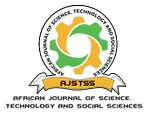Development and validation of digital medical laboratory educational platform
DOI:
https://doi.org/10.58506/ajstss.v1i2.17Keywords:
digital pathology, digital slide scanner, digital repository, virtual slides, learningAbstract
With the rise in whole slide scanner technology, large numbers of tissue slides are being scanned and represented and archived digitally. While digital pathology has substantial implications for telepathology, second opinions and education, there are also huge research opportunities with this new type of digital data. Accessibility to large digital repositories of tissue slides is a huge potential educational resource for medical students and pathology residents. In addition to education of medical students and residents, and clinical adoption, digital pathology has been transformative for computational imaging research. Many universities also do not have active pathology laboratories which are necessary in providing a steady flow of real life cases for medical training and research. Therefore, this project aimed at designing and validating a digital medical laboratory educational platform where learners could access the virtual slides from their individual student portals irrespective of where they log in from. With the use of a digital slide scanner, physical slides from the manual laboratory repository were scanned and stored in the cloud in digital format. The two platforms of both institutions were integrated so that the students’ online leaning portal was in sync with the Pathology Network’s digital repository. Once the integration was successful, the students were able to access and interact with the learning materials and virtual slides for Cytology and Cytological Stains which was the scheduled topic for teaching and learning.
The study recruited thirty five students from Meru University of Science and Technology pursuing undergraduate studies in Medical Microbiology. Majority of the students (33 out of 35; 94.3%) indicated that digital pathology enhanced their understanding of the topic of study due to availability of virtual slides with ease and at any time of day. All students (35 out of 35; 100%) felt that digital pathology teaching was beneficial to them as Medical Microbiology students and they all expressed their hope in continued learning with digital pathology to supplement face-to-face lectures. This preliminary study proved that the concept of digital pathology education is a viable venture in medical training particularly, in pathology and medical laboratory. There is need for additional work in terms of inclusion of more areas of coverage in the field laboratory medicine and development of virtual learning content, in order to validate the concept and upscale the local digital slide repository to enrich the use of digital pathology in Kenya and the region and also enhance teaching and learning. Digital pathology coupled with virtual microscopy shall progressively improve in the delivery of pathology and laboratory medicine training and education.
Downloads
Published
Versions
- 2023-01-31 (2)
- 2022-12-23 (1)


